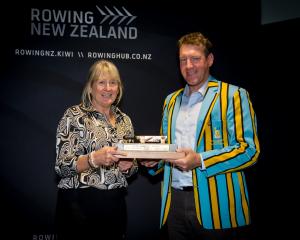This is the first of a series of articles by Alistair McMurran on the World Rowing Championships, which will be held at Lake Karapiro from October 31 to November 7.
When New Zealand was granted the 1978 World Rowing Championships, it had been a dominant force in the sport for 10 years.
The 2010 championships are being held at Lake Karapiro again because New Zealand is still a force in world rowing.
New Zealand crews won four gold medals at last year's world championships in Poland: men's pair (Eric Murray and Hamish Bond), lightweight double sculls (Peter Taylor and Storm Uru), single sculls (Mahe Drysdale) and lightweight single sculls (Duncan Grant).
These crews will be defending their titles in front of a parochial home crowd in the Waikato.
New Zealand has selected its largest team for a championships - 18 crews and 55 competitors.
The impetus that took New Zealand to the lofty heights of rowing in the decade before 1978 came from coach Rusty Robertson, chairman of selectors Fred Strachan and talented administrator Don Rowlands.
It was Rowlands who drove the work to develop Lake Karapiro into an international rowing lake.
The coach this time is Dick Tonks, who has the skills to get his rowers and scullers to work hard and become world champions.
A key person behind this year's championships is Tony Popplewell, the administration director.
Popplewell was a member of the New Zealand eight that competed in the Tokyo Olympics in 1964.
He has held management positions in every New Zealand Olympic or Commonwealth Games team from 1990 to 2008.
The world championships will run from October 31 to November 7, with the finals held on four days starting on Thursday, November 4.
"The finals used to be held over two days but the International Rowing Federation (Fisa) has reacted to pressure from television to have more consistent and shorter packages," Popplewell said.
"It is a model that will be used at the London Olympics in 2012."
There will be 52 countries and 800 rowers competing at Lake Karapiro.
"It is the biggest international sporting event to be held in New Zealand since the 1990 Commonwealth Games," Popplewell said.
"It is only the third world rowing championships to be held in the southern hemisphere."
There are significant differences between the 1978 championships and this year's event.
"In 1978 we organised a rowing regatta," Popplewell said.
"This time the emphasis is on an entertainment event with rowing being the major part."
The budget for holding the event in New Zealand is $14 million, most of which will come from government grants and private sponsorship.
The shortfall of $2.6 million will be made up from sales of tickets, which range in price from $19.95 on the first few days to $99.95 for grandstand seats at on finals days.
Elements contributing to the cost of the event are the grandstand, athletes' village and dining hall, as well as an upgrade to the course.
Work on the course started on October 1 and is now completed.
The television tower at the finish was erected on Thursday and the boat park will be opened on Monday.
There will be 15 cameras used for the television coverage provided by Sky Television, the host broadcaster.
Most of the overseas crews have arrived and they are training at different venues in the North Island: Wanganui, Rotorua, Mangakino and Tauranga.
Nearly ready to row
World Rowing Championships
Venue: Lake Karapiro.
Date: October 31 to November 7 (finals from November 4 to 7).
Crews: 800 rowers from 52 countries.
Ticket costs: $19.95 to $99.95.
Budget: $14 million.
NZ crews defending world titles: Men's pair (Eric Murray and Hamish Bond), the lightweight double sculls (Peter Taylor and Storm Uru), single sculls (Mahe Drysdale) and lightweight single sculls (Duncan Grant).











